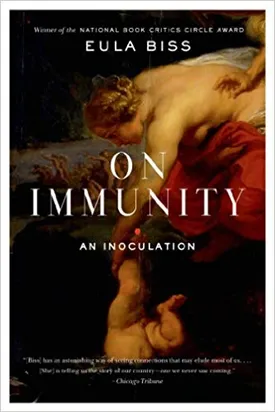On Immunity: An Inoculation by Eula Biss
On Immunity: An Inoculation by Eula Biss is a thought-provoking book questioning the relationships between biology, immunology, and society and explores the symbolic power of vaccination and its role in our society. Biss examines the history and political implications of vaccination within the United States and reflects on the implications of widespread vaccination both in and outside of her own life.
The attempts to protect humanity and “cure disease” through preventative methods is one of the primary topics of On Immunity: An Inoculation. Biss questions the extent to which “curing disease” through immunization has become a form of personal and political control. Biss goes on to explore how some radical anti-vaccination groups argue this form of action is ‘paternalistic’, insisting that it denies individuals the right to make their own decisions, a claim which she refutes.
Alongside a full address of the politics of immunization, the book delves into the personal ramifications of it. Biss goes through her own hesitations and fears when it comes to deciding whether or not to vaccinate her son, and questions the effects of vaccinations on both the body and the soul. She notes that immunization’s goal is to minimize our individual freedom in order to protect the greater collective, but asks if it is our moral obligation to prevent the possibility of harm in return for sacrificing the freedom of our individual bodies.
In addition to raising questions of morality, Biss investigates the difference between risks associated with disease and the “risks” of immunization in contradiction to the idea that vaccines are perfectly safe. She conducts a thorough investigation into the science behind immunization, and brings up well-discussed arguments on both sides of the vaccination debate.
Biss ties this discussion into the broader context of American culture, voicing her frustration with both the individual and institutionalized negligence of public health. Beginning with several “urban legends” concocted by immunization opponents, she takes a critical look at the culture of fear-based information and the integrity of public health care. She investigates the paradox of immunization, a tool which can both save and threaten lives and questions the nature of power and control in society.
Concluding with a call for a reconciliation of the individual’s freedoms with the needs of the world, On Immunity: An Inoculation seeks to shift the public perception of immunization and bridge the divides of the immunization debate. Utilizing personal anecdotes, scientific research and cultural critiques, Biss offers an insightful look into the morality and politics behind medicine, immunization, and the value of an individual in the collective.

